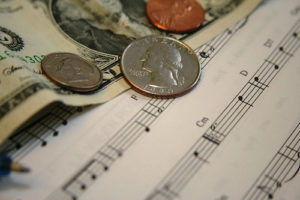Contributed by J.T. Lee
Learning an instrument is a wonderful thing for its own sake, but it can be especially rewarding when it

starts to pay off in real, financial terms. I first realized this when I got my first paying gig at the age of 17. Things got even better when I received a full scholarship in college for simply playing the right instrument well. At the time, the University of North Georgia was undergoing some massive changes and was in need of competent saxophone players. When I showed up to audition, my skill level, along with my instrument choice, made me something to be desired for their growing jazz program. The school already had plenty of piano, guitar, voice, and violin students, but what they needed were solid horn players. I ended up making money each semester while I was in school, simply because I played the right instrument with the right degree of skill, and I tried out at the right time.
Many times we don’t realize it, but there are real possibilities for students to see an early payoff for their musical skills, if only they can distinguish themselves from their peers. How do they break through the noise? Sometimes it’s as simple as your choice of instrument. Everybody wants to start on piano, guitar, and voice, and in many cases should, but there are times when adding a secondary instrument can increase a person’s marketability and help them to gain recognition in the industry faster. Take me for instance. I started on saxophone, but I now play six different instruments. The crazy thing is at one time or another I’ve gotten paid to play each one! Sometimes to see music pay off you have to learn more than one instrument. But how do you go about choosing a good secondary?
Of course we know that voice pairs well with piano or guitar, but these are the three most popular choices for students. In fact anyone seeking a music degree has to learn piano. So what else is there?
Guitar Players: Try giving bass a run. Bass players are a hot commodity in the music world. In fact I have friends that have doubled their amount of gigs simply by adding bass to their arsenal.
Piano Players: Piano players already have a tremendous amount of theory and technique under their belt, but in order to be relevant in today’s musical world you have to be able to play a synthesizer. While the mechanics are very similar to piano, there is a world of difference. Synths are highly programmed and function both as melodic and chording instruments depending on their set up. You can ask your teacher to help you develop these skills by going through the sounds on your keyboard and trying to match them to parts of songs you hear on the radio.
Because of the theory background of a piano player, it may also be easy for them to pick up a horn. Though the techniques are VERY different, students with a background in piano are already able to read music, putting them light years ahead of other beginning horn players. For this same reason, many piano players also do well with bass.
Horn Players: Try learning another instrument within the same family (i.e. brass or woodwind). Because I am a saxophone player, it is expected that I play flute and clarinet as well, so I do. Trumpet players should learn French horn, and low brass players should cycle around tuba, baritone, and trombone.
Consider drums as a secondary instrument. The most sought after players in the Atlanta music scene are solid drummers. There is a serious need right now for skilled set players. In fact, many of my friends who play drums currently have dates through the first of the year, and it’s only September! Drums may be another option for a piano player, and for voice students it’s a great way to work on your rhythm. Who knows? It may be your way to break into the music industry!
One last thought: there are countless scholarship opportunities for students who play the right instrument. Some of the least competitive include oboe, bassoon, double bass, bass clarinet, baritone saxophone, trombone, tuba, baritone, and French horn. Choosing to add one of these to your repertoire could mean the difference between going to the school you want or not. If you’re not majoring in music, they can still help you get auditions and scholarships. More scholarships means cheaper college and happier parents!
So whether you’re trying to go to school for music, or you just want to make some extra cash without having to work at McDonalds all summer, consider adding a secondary instrument to your studies. You never know, it could lead to your dream gig. I know it has for me.
